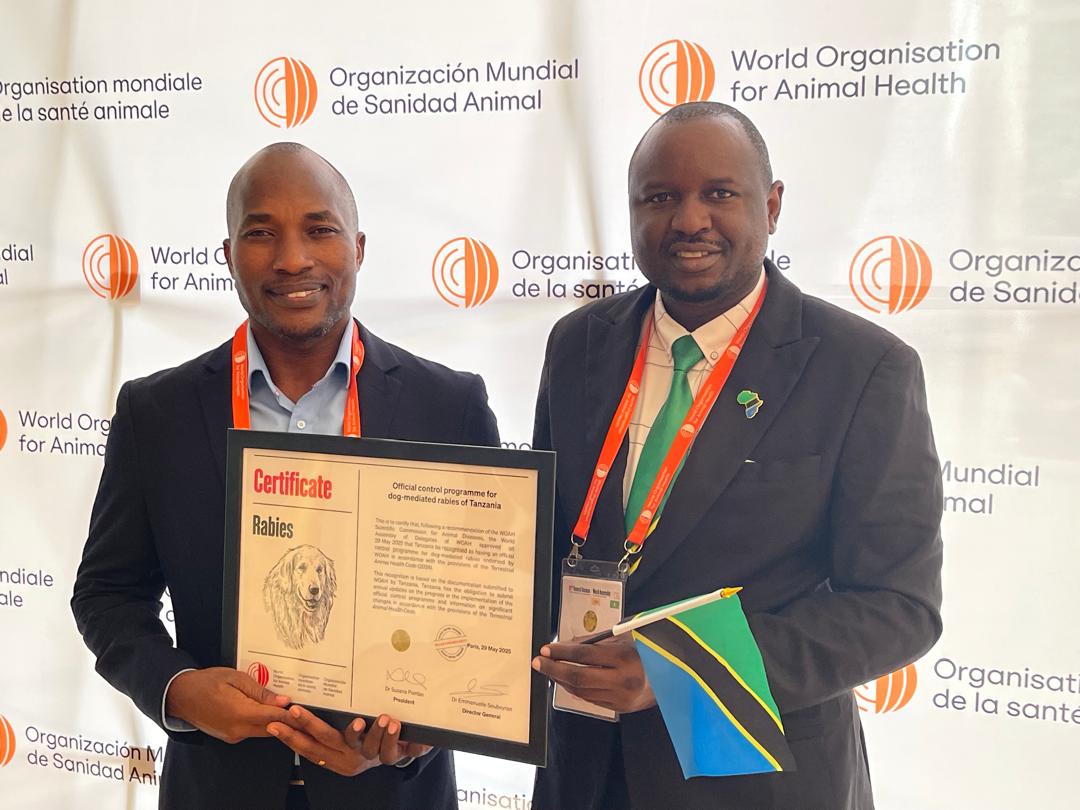
RECOGNITION: Tanzania earns global nod for its rabies control efforts

The Ifakara Health Institute proudly witnessed Tanzania’s historic endorsement of its rabies control programme by the World Organization for Animal Health (WOAH), announced at the 2025 WOAH General Assembly held from May 25th to 29th—a significant milestone in safeguarding public and animal health.
The formal handover of the endorsement certificate was made to the Tanzanian Ambassador to France, Ally Jabir Mwadini, on behalf of the Government of Tanzania. The event was attended by a delegation led by the Director of Veterinary Services, Tanzania’s WOAH delegate, private sector representatives, and Dr. Kennedy Lushasi from the Ifakara, who has played a key role in supporting the government’s rabies elimination initiatives.
This prestigious endorsement represents a critical turning point in Tanzania’s journey towards rabies elimination and underscores the country’s commitment to the global "Zero by 30" strategy, which aims to end human deaths from dog-mediated rabies by 2030. Tanzania now stands as only the fourth country worldwide, the third in Africa, and the first in East Africa to receive this certification.
The WOAH endorsement validates the strength of Tanzania’s Veterinary Services and the government’s capacity to implement effective surveillance, vaccination, dog population management, and public education programs that meet international standards.
Ifakara Health Institute’s Contribution to Rabies Control
The Ifakara Health Institute has been deeply involved in Tanzania’s rabies control efforts through research, technical support, and capacity building. Our work has focused on strengthening surveillance systems, enhancing diagnostic capabilities, and promoting integrated One Health approaches that bring together human, animal, and environmental health sectors. We have collaborated closely with the Ministry of Livestock and Fisheries and other partners to design and implement vaccination campaigns targeting dog populations in high-risk areas. By contributing scientific evidence and community engagement strategies, Ifakara has helped ensure that the rabies elimination programme is both data-driven and sustainable.
Benefits and Future Prospects
The WOAH endorsement opens several critical opportunities for Tanzania. It provides international validation of the country’s ability to control zoonotic diseases and unlocks access to greater technical expertise and capacity-building support. Furthermore, it is expected to boost political and financial commitment, strengthening Tanzania’s ability to attract funding and sustain long-term disease control initiatives. This achievement also positions Tanzania to assume regional leadership in rabies and livestock disease control.
Looking ahead, the Ministry of Livestock and Fisheries is set to scale up the implementation of the endorsed five-year national rabies elimination plan. This will involve expanding vaccination coverage to at least 70% of dogs in high-risk areas and enhancing multi-sectoral One Health collaborations to eliminate human rabies deaths. Ambassador Hon. Ally Jabir Mwadini, during the endorsement ceremony, expressed profound gratitude to the President of the United Republic of Tanzania, Dr. Samia Suluhu Hassan, for her visionary leadership and investment in health security. He emphasized that the country’s success would not have been possible without her bold commitment to safeguarding the health of both humans and livestock.
A Transformative Moment for Tanzania and East Africa
For Ifakara, Tanzania’s achievement as the first East African country to receive WOAH endorsement for its rabies control programme is a transformative moment. It not only validates the country’s technical capacity and strategic approach but also affirms Tanzania’s role as a leader in continental efforts to reach the global goal of zero human deaths from dog-mediated rabies by 2030. This endorsement establishes a strong foundation for expanding disease elimination initiatives and reinforces Tanzania’s commitment to protecting human and animal health through evidence-based, internationally recognized programmes
